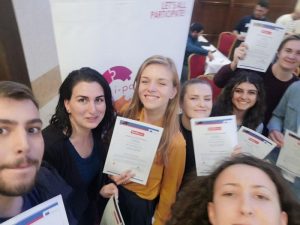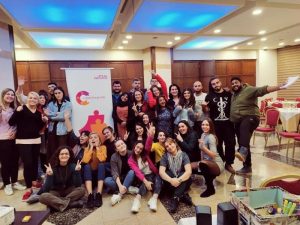Date/time
Date(s) - 29/11/2019 - 06/12/2019
All day
Locality
Larissa, Greece
Project type
Selected participants
feedback from one of the participant:
“We participated in a training called Developing Youth Work in the Greek city of Larissa. The project involved 30 young people from 14 countries such as Albania, the Netherlands, England, Cyprus, Slovakia, Georgia and others. An interesting program was prepared for us every day, led by coaches from Greece and England.
Together with the other participants, we addressed and led discussions on topics focused on how young people use social media. We have learned new information about the pitfalls of the Internet or social networks. We worked in groups and looked for solutions on how we could work better with social media and how it could be used in youth work.
In addition to discussions and tasks, we also had a lot of fun. We had games and activities in the city, during which we could meet the locals, but also strengthen relationships with other participants in the project. One day we took a trip to the nearby town of Volos, where we also swimmed in the sea although was December 🙂
We also took part in an international evening, where we presented Slovakia with our traditional sweets and taught other participants something about our country thanks to an entertaining quiz. After a week, we returned home full of experiences, new ideas, inspiration and above all with new friendships with people from all over the world. We met really amazing people with whom we are in contact to this day.”
Andrea Kaluzova


SUMMARY what was training about:
Social media sites, online games, video-sharing sites and gadgets such as iPods, iPads and mobile phones are now part of the culture of young people. They have permeated young lives in such a degree, that it is hard to believe that these technologies hardly existed less than a decade ago. Today, young people may come of age and struggle for autonomy and identity, as their predecessors did. However, they do so in the midst of new worlds of communication, friendship and self-expression and it is based on the use of digital media. Digital Media and Technology has transformed how we teach and learn. The learning and self-development process do not always begin with teachers, they are also initiated by the learner, or supported by a youth worker. Digital media and technology it can’t be anything but part of youth workers’ training and capacity.
Young people in Europe spend an increasing amount of their time consuming digital media and (video streaming, messaging, networking, blogging, gaming, etc.). Some of the problems that young people are facing today are directly connected to digital media and especially social media, such as pressures of 24/7 social networking, hate speech online, cyber-bullying, internet and online games addiction. Unfortunately in almost all European countries, there are cases that young people were even led to suicide because of cyber-bullying or hate speech online or various, serious internet addictions. All young people today need technological skills, social media literacy and an agile attitude towards technology in their future work and daily life, and this should be encouraged by youth workers.


Aim of the training:
“ToDAY: Developing digital youth work” project aimed to promote quality youth work through supporting open and innovative practices and by helping youth workers understand digital youth work and develop their capacity on digital youth work. It supported digital youth work in a local, national, regional and European level.
Objectives
- To familiarise with and better understand digital youth work approaches and to be prepared to introduce digital approaches to their youth work practice. Youth workers will be able to support young people to develop the skills, competences and courage to actively shape digital technologies
- To identify innovative practices in both delivering digital youth work and upskilling youth workers’ digital competences and to exchange good examples of how digital tools are used in youth work in Europe
- To develop youth workers’ skills, competences and knowledge on digitalization through training that meets their needs and the needs of their communities and young people they work with
To create a network of youth workers from several European countries and support participating organisations to provide youth workers with tools, methods and practices for understanding digital youth work - To practice and be able to use in their daily work with young people the Erasmus+ Virtual Exchange project of the EU
- To create space for making new contacts, creating new networks and exploring Erasmus+ Youth opportunities to develop digital youth work in future
You can find developed manual for digital youth work here:
Participants were from Albania  , Armenia
, Armenia  , Bulgaria
, Bulgaria  , Cyprus
, Cyprus  , Denmark
, Denmark  , Georgia
, Georgia  , Italy
, Italy  , Latvia
, Latvia  , Romania
, Romania  , UK
, UK  , Spain
, Spain  , Netherlands
, Netherlands  and Slovakia
and Slovakia  .
.


